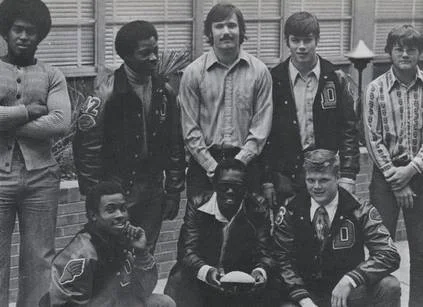By Shaun Treat
Dentonites were abuzz at the Thin Line Film Festival this past February over the debut of the Denton-centric WHEN WE WERE ALL BRONCOS documentary, which chronicles the 1968-1973 school desegregation process alongside the Denton High School football team’s epic race to the ’72-73 state championship. Native son and filmmaker David Barrow, who wowed audiences with a poignant record-breaking premiere, has been honored by our city council who resolved last week that today, July 15th, would be named "David Barrow Day" because of his great work on the film. In honor of the new dubbing this day has received, we're running WDDI contributor Shaun Treat's review of the documentary which you can read below. If you haven't had the chance to check it out yet, you can grab a copy over at Recycled Books. Our town’s story of school desegregation is indeed uniquely remarkable, offering a glimpse into how those racially troubled times played-out a bit differently in Denton back in the day. Read on for more...
Barrow’s documentary is definitely a labor of love devoted to his hometown, but it is also careful to acknowledge that racial desegregation was neither easy nor immediate. Through interviews with townspeople, his fellow students at Denton High School, and his teammates on the 1972-73 Bronco football team at their 40th reunion, Barrow tries to understand how Denton emerged from the dark days of Jim Crow racial segregation to become the diverse and dynamic center for education, the arts, and multiracial Texas culture it is today. African-American students across Denton County had attended Fred Moore High School in Southeast Denton until the 1968-9 desegregation of Denton High School brought them all under one roof. Although the main narrative traces the amazing state championship bid of its racially integrated football team, When We Were All Broncos also tells the story of the students, educators, and community who rallied around the shared challenges they faced despite – or sometimes because of – their differences.
In 1954, the same year as the groundbreaking SCOTUS Brown v Board of Education ruling, educator Alfred Tennyson Miller quietly petitioned North Texas State University to enroll in a doctoral course. "It is my conviction that my entrance now would contribute much to the successful, inevitable integration of Negroes into the school," Miller wrote. It wasn’t until a lawsuit the following year by Joe Atkins, who had been denied undergraduate admission, that US District Judge Sheehy issued an injunction prohibiting the school from race-based admission policies. Irma E.L. Sephas became the first African-American undergraduate student at North Texas in 1956, officially initiating racial desegregation. 1956 also saw Abner Hayes and Leon King begin integration of the NTSU football team under the visionary leadership of Head Coach Odus Mitchell and his assistants Fred McCain, Herb Ferrill, and Ken Bahnsen, whose away-games sometimes involved angry mobs pelting their bus with rocks and bottles or refusal to accommodate the team with food or boarding. Such prejudice only brought the team closer together in solidarity, a full 10 years before the Southwest Conference desegregated college football.
Yet there were also some ugly incidents at home, where African-American students lived in the segregated neighborhoods of Southeast Denton because they were still denied on-campus housing, racial epithets chalked on NTSU sidewalks had to be washed away, and burning crosses appeared not only in front of the administration building but also the house of NTSU President J.C. Matthews. A peaceful 1961 student stand-in at the still-segregated Campus Theatre was also marred by drive-by gunshots, but by then the arc of history was clear to many Dentonites. As racial violence and Civil Rights resistance in other cities became a nightly news item, the Denton City Council in 1963 declared city facilities and programs open to all races, and the integration mavens of the Denton Women’s Christian Interracial Fellowship began their own community movement.
By the time the Fred Moore High School closed in 1968 to integrate with DHS, the same year that MLK then RFK were tragically assassinated, Barrow’s eighth-grade class had little idea they would be making history. "One of the things I always thought about was how lucky we were,” Barrow marvels; “It was a special time. You think what a small group of people actually straddle that time before and after desegregation, it makes you think. And I wanted to go back and not just kind of reminisce about that team, but also look at the history of Denton.” Barrow has arranged to donate a sizeable portion of profits to the Denton Public School Foundation, with the goal of creating a $10,000 permanent endowment towards an annual scholarship to a deserving DHS senior. When We Were All Broncos tells an incredible story of turbulent times confronted with challenges and change, and a school system that forged a unique path through racial desegregation on its way to its first state football championship showdown in 43 years. While acknowledging the shortcomings and struggle familiar to that era, Barrow’s film nonetheless provides a gripping history wherein it was Denton that eventually emerged as the triumphant winner, thanks to our committed community champions.
Shaun Treat is an assistant professor in Communication Studies at the University of North Texas and founder of the Denton Haunts historical ghost tour. Doc has written about numerous local places and personalities at his Denton Haunts blog, and is forever indebted to the great work of the fine folks with the Denton County Historical Commission and local keepers of history like Mike Cochran and Laura Douglas at the Emily Fowler Library for their tireless work in helping preserve Denton’s intriguing past. You can purchase WHEN WE WERE ALL BRONCOS at Recycled Books.


